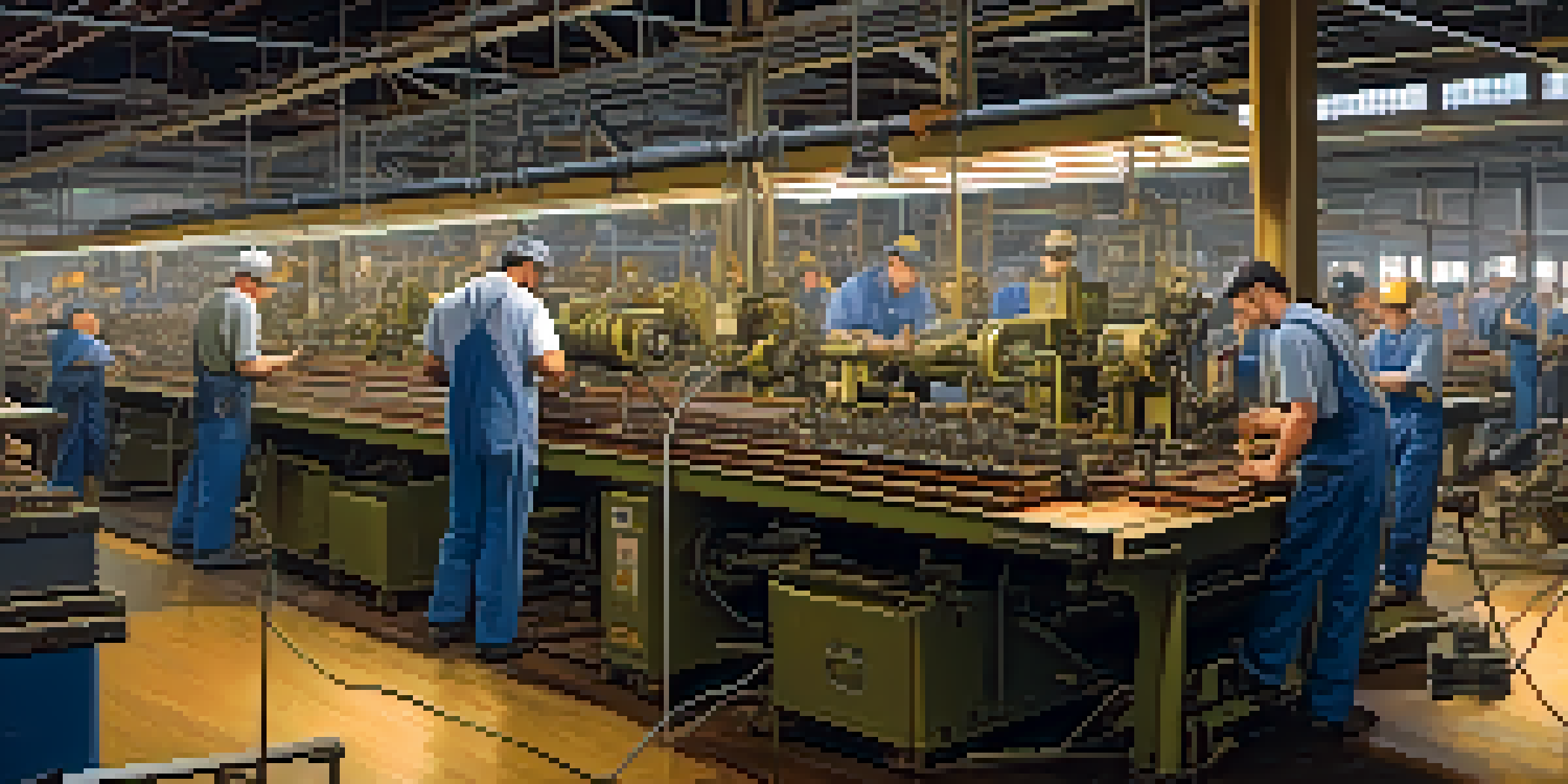Economic Challenges Facing Pennsylvania's Key Industries

Manufacturing Sector Struggles Amid Global Changes
Pennsylvania's manufacturing sector, once the backbone of its economy, is facing significant challenges. With the rise of automation and global outsourcing, many local factories are struggling to keep up. This shift not only puts jobs at risk but also affects the entire supply chain, leading to increased costs and delays.
The greatest danger in times of turbulence is not the turbulence; it is to act with yesterday's logic.
Moreover, the recent pandemic accelerated changes in consumer behavior, pushing many manufacturers to adapt quickly or risk falling behind. Businesses that traditionally relied on local markets now find themselves competing with international players who can often produce goods at lower costs. This has forced Pennsylvania manufacturers to innovate, but not all have the resources needed to pivot effectively.
In response, industry leaders are advocating for policies that support workforce development and investment in technology. By focusing on upskilling workers and adopting new manufacturing techniques, they hope to regain a competitive edge. However, the path forward remains uncertain as companies grapple with both immediate and long-term economic pressures.
Agriculture Faces Climate and Market Pressures
Agriculture has long been a vital part of Pennsylvania's economy, but it is now facing a unique set of challenges. Climate change is leading to unpredictable weather patterns, which can devastate crop yields and affect livestock health. Farmers are increasingly concerned about their ability to adapt to these changes, as traditional farming practices may no longer suffice.

Additionally, market pressures from larger agricultural corporations are squeezing small to mid-sized farms. These local producers often cannot compete with the pricing and distribution networks of larger entities, leading to a decline in family-owned farms. As a result, communities are losing not just their agricultural roots, but also their cultural heritage.
Manufacturing Sector Faces Challenges
Pennsylvania's manufacturing industry struggles with automation and global competition, impacting jobs and supply chains.
To combat these issues, many farmers are turning to sustainable practices and diversifying their crops. This approach not only helps mitigate the effects of climate change but also appeals to a growing consumer base that prioritizes local and organic products. However, transitioning to these practices requires upfront investment, which can be a significant hurdle for many.
Energy Sector Transitions and Economic Implications
Pennsylvania's energy sector is undergoing a significant transformation, particularly with the shift from coal to renewable sources. While this transition is essential for environmental sustainability, it comes with economic challenges. The decline of coal mining has resulted in job losses, especially in rural areas that heavily relied on this industry for employment.
In the midst of chaos, there is also opportunity.
The push for cleaner energy has also led to increased competition among energy producers, which can drive prices down. While this is beneficial for consumers, it puts pressure on traditional energy companies to adapt quickly or risk financial instability. Striking a balance between economic growth and environmental responsibility is a challenge that must be addressed.
In response, state leaders are exploring ways to support workers during this transition, such as retraining programs and investment in new energy technologies. By focusing on creating jobs in the renewable sector, they hope to revitalize affected communities while contributing to a greener future. However, the success of these initiatives will depend on collaboration between government, industry, and local stakeholders.
Tourism Industry Recovers from Pandemic Disruptions
The tourism industry in Pennsylvania was hit hard by the COVID-19 pandemic, but signs of recovery are beginning to emerge. As restrictions lift and travelers feel more comfortable exploring, destinations are working to attract visitors back. However, the road to recovery is fraught with challenges, including staffing shortages and changing consumer preferences.
Many tourism operators are struggling to find qualified staff as workers have moved on to other industries during the pandemic. This shortage can lead to reduced services, which may deter visitors looking for a quality experience. Additionally, travelers are now more focused on safety and health protocols, prompting businesses to adapt their offerings accordingly.
Agriculture Adapts to New Pressures
Farmers in Pennsylvania are turning to sustainable practices to combat climate change and market competition from larger corporations.
To stay competitive, Pennsylvania's tourism sector is embracing technology and innovative marketing strategies. Virtual tours, contactless services, and enhanced online booking systems are just a few ways the industry is evolving. As they navigate these challenges, local businesses hope to reclaim their position as a top destination while ensuring a safe and enjoyable experience for visitors.
Healthcare Industry Faces Rising Costs and Access Issues
The healthcare industry in Pennsylvania is grappling with rising costs that affect both providers and patients. As expenses for medical supplies, staffing, and technology increase, many healthcare facilities are forced to make tough decisions about budget allocations. This can impact the quality of care, especially in underserved areas.
Access to healthcare remains a critical issue, particularly for low-income populations. Many rural communities lack adequate medical facilities, forcing residents to travel long distances for basic care. This not only creates barriers for patients but also strains the healthcare system as a whole, as emergency services become overwhelmed.
To address these challenges, healthcare providers are exploring telehealth options and community outreach programs. By utilizing technology, they aim to improve access and reduce costs for patients. However, implementing these solutions requires significant investment and support from both the state and federal governments.
Education Sector Adapts to New Economic Realities
Pennsylvania's education sector is facing its own set of economic challenges, particularly in funding and resource allocation. Many school districts are struggling to provide quality education due to budget constraints, which can lead to larger class sizes and fewer program offerings. This situation is especially pronounced in lower-income areas, where resources are already limited.
The pandemic has exacerbated these issues, highlighting the digital divide among students. Many families lack access to reliable internet and technology, which hinders remote learning efforts. As educators strive to bridge this gap, they are increasingly advocating for policies that prioritize equitable funding and resources for all students.
Tourism Industry Works to Recover
As the tourism sector rebounds from the pandemic, businesses are adapting to staffing shortages and changing consumer preferences.
In response, state and local governments are exploring innovative funding solutions and partnerships with community organizations. By focusing on increasing investment in education, they hope to create a more equitable system that prepares students for the future. However, achieving these goals requires a collective effort from all stakeholders involved.
Retail Sector Adapts to Evolving Consumer Habits
The retail sector in Pennsylvania is undergoing a transformation as consumer habits shift dramatically. With the rise of e-commerce, brick-and-mortar stores are facing increasing pressure to innovate and provide unique shopping experiences. Many shoppers now prefer the convenience of online shopping, prompting retailers to rethink their strategies.
As a result, many local businesses are investing in their online presence and enhancing their customer service to compete effectively. This includes offering delivery options, curbside pickup, and personalized shopping experiences. However, the transition to a robust online model can be challenging for smaller retailers with limited resources.

To thrive in this evolving landscape, retailers must leverage technology and adapt to changing consumer expectations. This may involve collaborating with local suppliers and focusing on sustainability to attract conscious consumers. While these efforts present opportunities for growth, they also require significant investment and commitment from business owners.
Conclusion: A Call for Collaborative Solutions
As Pennsylvania navigates the economic challenges facing its key industries, collaboration will be essential. Engaging stakeholders from government, business, and community organizations can help identify innovative solutions that address these pressing issues. By working together, Pennsylvania can create a more resilient economy that benefits all residents.
Investing in workforce development, sustainable practices, and technological advancements will be crucial for revitalizing industries. Additionally, supporting local businesses and prioritizing equitable access to resources can foster community growth and stability. These collective efforts can help Pennsylvania's economy thrive in an ever-changing landscape.
Ultimately, the journey forward requires a shared commitment to overcoming challenges and seizing opportunities. By embracing collaboration and innovation, Pennsylvania can emerge stronger and more adaptable, ensuring a brighter future for its key industries and the communities they support.